
Politics
Premium
Uhuru succession battle shapes up to four-horse contest
What you need to know:
- DP Ruto meets more than 400 leaders at his Karen residence, calls other groupings tribal.
- Mukhisa Kituyi, who jetted into the country on Sunday, says he is neither Kieleweke nor Tangatanga.
The battle to succeed President Uhuru Kenyatta and the by-elections next month are shaping up into a race of four formations angling to gain political momentum and use it to sprint to the finish line in 2022.
Deputy President William Ruto with his “Hustler Nation” brigade is one of the camps that has gone full throttle against Orange Democratic Movement (ODM) leader Raila Odinga, seen as his biggest challenger in the 2022 race.
Mr Odinga has not formally announced his fifth presidential bid. He leads the second formation and seems to have the support of the President, his March 9, 2018 handshake partner.
Then there is a new formation of Wiper party leader Kalonzo Musyoka, his Amani National Congress (ANC) colleague Musalia Mudavadi, Ford-Kenya’s Moses Wetang’ula and Kanu’s Gideon Moi who have launched joint campaigns for the March 4 by-elections under the One Kenya banner.
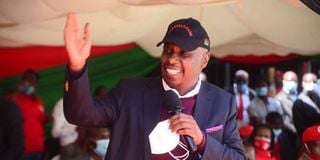
Baringo Senator Gideon Moi speaks during a townhall meeting of the Kanu party's Nairobi branch delegates, at Bowling Green Grounds in Parklands, Nairobi County, on December 10, 2020.
Kenyatta-Odinga-led BBI
Though the four have coalesced around the President and back the Kenyatta-Odinga-led Building Bridges Initiative (BBI), they have shown the strongest indications of a plan to run their campaigns without the ODM chief.
The fourth group is made up of politicians that see themselves outside the spectrum of the first three formations, but who do not seem to have a problem with President Kenyatta or his relationship with Mr Odinga.
These are former United Nations Conference on Trade and Development Secretary-General Mukhisa Kituyi and governors Kivutha Kibwana (Makueni) and Alfred Mutua (Machakos).
Dr Mutua is also the Maendeleo Chap Chap party leader, while Dr Kituyi is a former Trade minister.
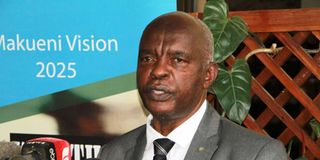
Makueni Governor Kivutha Kibwana.
Dr Kituyi, who jetted into the country from Europe on Sunday, says he is not aligned to any of the leading groups.
“The fact that I am outside the forest means I can see the canopy better than those inside. I am not in the National Super Alliance (Nasa) or Jubilee. I am not in Kieleweke or Tangatanga,” he said.
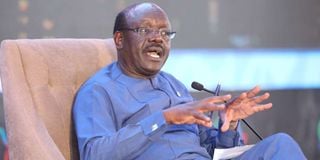
Former United Nations Conference on Trade and Development secretary-general, Dr Mukhisa Kutuyi, during the Kusi Ideas Festival in Kigali, Rwanda.
“If I start to identify with any of these group, I will lose the goodwill and capital that I already have.”
The Kabuchai and Matungu parliamentary by-elections as well as the Machakos Senate one present the ultimate test for the four formations, coming just under three months to the planned BBI plebiscite.
The DP, who has anchored his campaign on the “Hustler Narrative”, termed the other formations backward and tribal.
Ruto's journey
“I am in this journey even if I remain alone. They can form all the alliances they want. They have no clue where this country is supposed to go,” he said at his Karen residence, where he met 400 leaders from Nairobi, Mombasa Nakuru and Nyanza, accompanied by eight MPs, yesterday.
“I am happy they have started early and I can see them. Let them get their houses in order and tell us their candidate because ‘hustlers’ are ready on this side.”
He added that 16 million jobless Kenyans do not need tribal leaders.

Deputy President William Ruto addresses Isiolo County's residents at Kiwanja in Ngaremara on February 13, 2021.
“We need visionary people who can think for Kenya. That is why we are activating the coalition of the people with ideas through the ‘Hustler Nation’. This will advance the allocation of more resources at the base of the wealth pyramid,” he said.
Of the four formations, the Kalonzo-Mudavadi-Wetang’ula-Moi one has gained fresh momentum in the recent past, with the team taking its unity campaign and possible 2022 coalition pact to Matungu where ANC’s Peter Oscar Nabulindo wants to capture the seat left vacant with the death of Justus Murunga late last year.
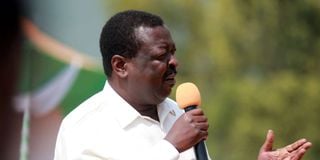
Politician Musalia Mudavadi, leader of the Amani National Congress (ANC) party.
The four also support Ford-Kenya’s Majimbo Kalasinga in Kabuchai as well as Wiper’s Agnes Kavindu Muthama in Machakos.
In an interview last week, Mr Musyoka said while the four have not settled on who will fly the alliance’s flag in 2022, they have vowed to stay together.
He argued that Mr Odinga is locked out of the 2022 race by an agreement signed by Nasa partners in 2017.
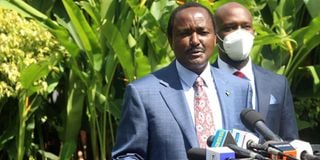
Wiper party leader Kalonzo Musyoka addresses the Press at Serena Hotel, Nairobi on January 18, 2021.
ODM has dismissed the idea, saying, the deal was predicated on the renewal of the Nasa pact in 2022.
“The coalition agreement provided that ODM would not field a candidate in 2022 only if the deal, which expires at the end of this Parliament’s term, is renewed,” ODM Secretary-General Edwin Sifuna said.
“We can only discuss that if and when it happens.”
The ODM has already called for applications for the presidential ticket.
Even though Mr Odinga has not said if he will fight for the country’s top seat again, he is seen as the clear frontrunner in the Orange party.
Some of his allies and those of President Kenyatta are fronting him as the best man to beat the Deputy President.
A few weeks ago, Mr Kenyatta’s Jubilee faction asked ODM to sign a formal agreement with the ruling party — a deal that goes beyond the Kenyatta-Odinga handshake.
During a meeting with leaders in Nairobi, Mr Odinga said Jubilee and ODM would work together in popularising BBI and possibly the General Election.
More than three alliances
“It is clear that there will be more than three alliances. No one will go to elections alone. The main players are just the same people in Kenyan politics. They will realign themselves in the General Election,” Prof Ken Oluoch, who heads the Political Science Department at Moi University, told the Nation.
In Kabuchai on Tuesday and Matungu yesterday, the Kalonzo-Mudavadi-Wetang’ula-Moi group said it would give the country better leadership.
“Our unity and strength are derived from the people. We will work together for we believe the change that Kenyans want will come from this team,” the Kanu chairman, who is also the Baringo senator, said.
Mr Musyoka said the alliance would improve the lives of all Kenyans.
With the proposed expanded Executive, governance expert Javas Bigambo argues that there are opportunities politicians can use to form coalitions and that there is likelihood of the 2022 General Election having more of such arrangements.
The BBI proposes the creation of the position of a prime minister, two deputy prime ministers in addition to the deputy president.
Cabinet Secretaries will come from the National Assembly, giving politicians a wide array of options to negotiate with regional kingpins and second-term governors ahead of the election.
Pre-election coalitions
Prof Egara Kabaji of Masinde Muliro University of Science and Technology, Kakamega, said the country will definitely witness more coalitions ahead of the General Election.
“Those of the ‘Yes’ side during the referendum will start planning on who will be the president, prime minister and deputies,” he said.
“Forget these things they are telling us about 35 per cent of the national resources being given to counties. They will go into the 2022 elections knowing who will be who.”
Constitutional lawyer Bobby Mkangi said the BBI proposal gives strength to pre-election coalitions if they win the elections.
“Any coalition or alliance will want to win an election. Once they emerge victorious, they have the powers of running the government.
“It is a fallacy to say we can hold an election that does not produce a winner and a loser,” Mr Mkangi said yesterday.
“Adding a few positions without a formula and saying that we reserve those seats for women or regions does not cure anything.”
Additional reporting by Brian Ojamaa. [email protected].






